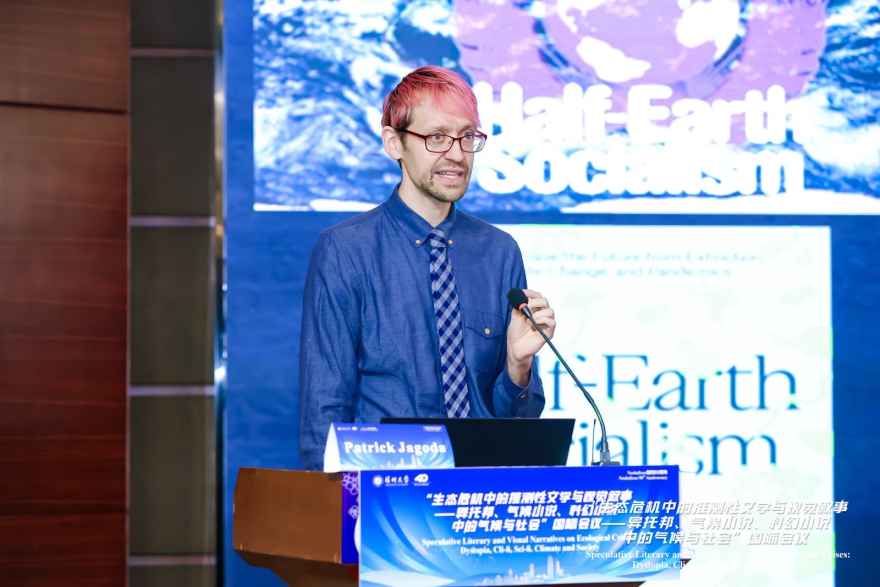Serious Gaming in China: Humanities Professor's Journey to the No. 1 Mecca of the Gaming Industry

By Sara Patterson
Globally, digital games of all types and persuasions are big business. Industry experts report in 2023 that approximately 3.38 billion people worldwide play games. The global market for the gaming industry in 2023 was expected to reach $187.7 billion in revenue, according to Newzoo. To place this in perspective, movies worldwide generated $26 billion in revenue, and streaming services revenue was approximately $1.1 billion in 2023, according to Grand View Research. In order of their size, China, the U.S., and Japan are the top markets for the gaming industry.
“We’ve seen a growing difference between the size of the gaming and film industries,” said Patrick Jagoda, the William Rainey Harper Professor in the Departments of English Language and Literature, Cinema and Media Studies, and Obstetrics and Gynecology, and faculty director of the Weston Game Lab and the Media, Arts, and Design major at UChicago. “The cinematic box office is not the juggernaut it was when I was growing up compared to a gaming industry that has skyrocketed across mobile, computer, and console contexts. Plus we’re seeing newer virtual, augmented, and mixed reality gaming applications. More than that, though, I’m interested in the ways that both digital and analog games can build on cinema, and help us address wicked problems such as climate change, economic income disparity, and public health.”
In November 2023, Jagoda traveled to Shenzhen, Hong Kong, and Beijing in China to deliver several lectures about game studies and game design for climate change, host a creative worldbuilding workshop with local peers, and give several interviews to the prominent Chinese news outlets, including the Beijing News, Jiemian, Jiemian News app, and HUXIU. In these presentations, the workshop, and media interviews, he focused on the difference between gamification and serious games, and how serious games can change the world.
“Games can be a cultural engine and driving force for social change, but they need to be used responsibly,” said Jagoda in the keynote presentation speech titled “Video Games and the Modern Society” at the UChicago Beijing Center. “Although ‘gamification’ can often bring about short-term behavioral change, it’s important to design serious games to target long-term behavioral and social changes.”
The audiences for Jagoda’s lectures and workshop were enthusiastic about his ideas and examples, such as Terrarium, a transmedia game about climate change, and parasite, a transmedia game about diversity, dissensus, and difference, both developed with the Fourcast Lab and students at UChicago. After the lectures in Beijing and Hong Kong, Chinese students and faculty members lined up for hours to ask questions and talk to him.
“I gained a sense of hope, creativity, and imagination from these conversations,” Jagoda said. “Many audience members responded to my ideas for serious games or envisioned their own examples. I am impressed with the Chinese students and faculty I met and gained many new connections and emergent ideas.”
This was Jagoda’s first visit to the Chinese mainland. Before the pandemic, he had traveled to Hong Kong with members of UChicago’s Game Changer Chicago Design Lab. One of the points of interest are his recent books, Experimental Games: Critique, Play, and Design in the Age of Gamification (2020) and Transmedia Stories Narrative Methods for Public Health and Social Justice (2022). In Experimental Games, Jagoda contends that games, including video games, serve as a form of staging, encountering, and testing experience and reality. Whereas, in Transmedia Stories, he discusses using games and narrative to make an impact in areas such as public health, education, the social sciences, and activism.
Jagoda is taking a different approach to using humanistic knowledge in the wider world through games. During his visit, he made a big splash in the Chinese media, resulting in readership and views of more than three million through both digital platforms and traditional news.
“Games have the possibility of garnering curiosity, and encouraging multimodal learning which offers interactive, experiential, visual, sonic, and textual ways in for students, compared to the more limited means of a traditional lecture,” Jagoda said. “Games can engage participants in problem solving through their sound design, graphics, programming, and diversity of embedded content areas. The games I collaborate on incorporate information from medical professionals, climate scientists, epidemiologists, and more. I can imagine few other cultural forms that encourage so much interdisciplinary opportunities. For solving problems, serious games have built-in forgiveness, and a sense of safe failure, so if you don’t succeed, you can try again. Games are both competitive and cooperative.”
During his visit to China, Jagoda met a few UChicago alumni, including Jessica Zhan, AB’22 in Art History, Honghan Song, MAPH’22, and Yanxiao He, PhD’23 in Near Eastern Languages and Civilizations. He was thrilled to see how they applied what they learned at UChicago in China. Zhan is a program coordinator who authors reports on gaming; Song researches games and game studies; and He explores applications of humanistic knowledge to popular culture.
“There is a heightened interest in game studies and game design in China, and I talked to many students who demonstrated a strong interest in pursuing those fields of study,” Jagoda said. “Currently, however, Chinese University faculty members are not yet integrating games into their curricula, while UChicago has been investing in this exciting new area.”
He observed that UChicago is fortunate to have Centers in Hong Kong, Delhi, and Beijing, where Asian students can learn about games and game design in different contexts. Many East Asian students apply to UChicago’s PhD programs in Chicago and worldwide.
If you are interested in supporting the Media Arts, Data, and Design Center or Patrick Jagoda’s work, please reach out to Sarah Zimmerman, Director of Development for the Humanities Division, at zimmermans@uchicago.edu.